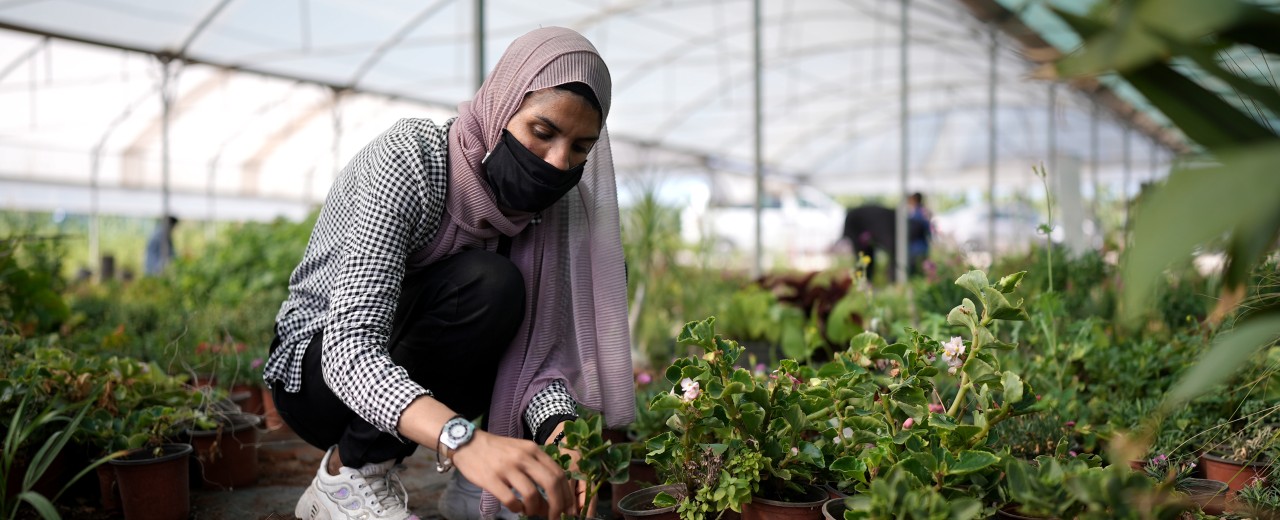
As of: 07/2024
One in two young people in Lebanon are unemployed. Among refugees, this figure is even higher. The country has one of the youngest populations in the world, with 44% under 24 years old. Competition on the labour market is fierce, and even more so among young people. Many activities are carried out informally. But even in the case of such informal activities, many young people lack the necessary skills and knowledge. Courses promoted by KfW and implemented by UNICEF Lebanon are intended to get them ready for the world of work. While some young people learn basic skills such as reading and mathematics, others learn work-related skills and prepare for a job or starting their own small business. Commissioned by the German Federal Government, KfW is currently supporting employment promotion with EUR 23 million for phases VI and VII.
In a global comparison, Lebanon has taken on a particularly high number of refugees in relation to its population size, hosting 1.5 million Syrians who have been displaced from their homes due to the civil war and half a million Palestinians. At the same time, Lebanon is experiencing an economic crisis that has been exacerbated by the pandemic. The refugees, in turn, are particularly affected: between 80 and 90% of them live below the national poverty line. The unemployment rate among young people is 50%: jobs are becoming scarcer and scarcer, so competition for them is high. In addition, young people lack not only experience, but also skills and knowledge, even for basic work in the informal sector. Refugees are also only allowed to work in narrowly defined sectors, namely construction, agriculture or the environment sector, such as in waste disposal. The poor prospects are putting a strain on young people and also leading to psychological problems. All these problems are affecting women and girls in particular: their labour force participation rate is only around 22%, compared to 66% for men.

To help young people – both nationals and refugees – gain access to the labour market, UNICEF Lebanon is offering courses to develop their professional skills. The courses are aimed at young people aged between 15 and 24 years. The aim is for girls and boys, and Lebanese and refugee adolescents to all participate in the courses in equal measure. A total of 2 per cent of places are reserved for people with disabilities.
On behalf of the Federal Ministry for Economic Cooperation and Development (BMZ), KfW is currently financing these courses with EUR 23 million. Funds have already been provided for previous phases since 2015. The funds come from the budget of the BMZ's Middle East employment initiative.
The courses do not correspond to the kind of training offered in Germany. Rather, each module involves around 120 to 240 hours of theory, partly combined with 40 internship days. Career counselling at the beginning allows participants to find out about different professions and determine which match their preferences and skills. The internships take place as part of "cash for work" assignments, whereby the participants carry out basic work such as auxiliary work in the road construction or sanitation sector, basic electrics work or painting work. Some young people first acquire basic skills such as reading, writing and mathematics. English, computer skills and financial knowledge are also part of the curriculum. Training also takes place on overarching topics such as conflict management and personal development. As part of a gender-specific module, women receive special support in the areas of leadership, self-confidence and the prevention of gender-specific violence. Additionally, particularly motivated young people can take in-depth courses or complete further training with the aim of starting a small (micro) enterprise.
The project has reached more than 100,000 young people in its previous phases, of whom more than half are women and refugees.
UNICEF has also set itself the goal of getting some of the programme’s graduates into work. With the knowledge and practical experience they have gained, the young people have acquired the basic skills they need in order to have opportunities for at least informal work, and in some cases even for formal employment, on the highly competitive Lebanese labour market. This will reduce poverty and improve the future prospects of young people. Women and girls in particular benefit from the modules on confident communication, self-esteem, stress management and decision-making. All participating young people develop their skills and receive valuable insights into various professional activities. This allows them to better assess what jobs they could do. Since Lebanese and refugee young people work side by side in the practical assignments, the project also aims to strengthen solidarity between them.
The project contributes to the achievement of these following United Nations Sustainable Development Goals:
KfW Group
KfW Development Bank
Middle East, crisis prevention and management
Share page
To share the content of this page with your network, click on one of the icons below.
Note on data protection: When you share content, your personal data is transferred to the selected network.
Data protection
Alternatively, you can also copy the short link: https://www.kfw-entwicklungsbank.de/s/enzB1BXV
Copy link Link copied